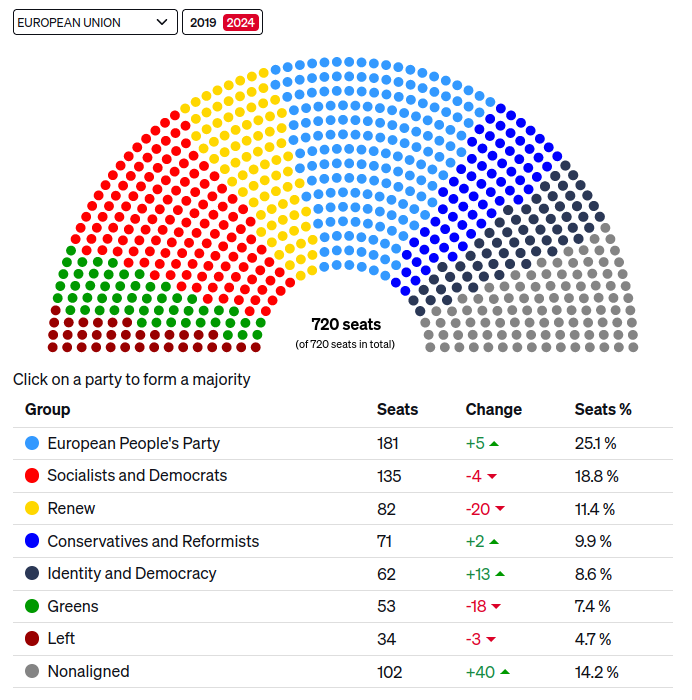this post was submitted on 09 Jun 2024
478 points (99.0% liked)
Europe
8484 readers
1 users here now
News/Interesting Stories/Beautiful Pictures from Europe 🇪🇺
(Current banner: Thunder mountain, Germany, 🇩🇪 ) Feel free to post submissions for banner pictures
Rules
(This list is obviously incomplete, but it will get expanded when necessary)
- Be nice to each other (e.g. No direct insults against each other);
- No racism, antisemitism, dehumanisation of minorities or glorification of National Socialism allowed;
- No posts linking to mis-information funded by foreign states or billionaires.
Also check out !yurop@lemm.ee
founded 2 years ago
MODERATORS
you are viewing a single comment's thread
view the rest of the comments
view the rest of the comments

I think that the difference between PR and FPTP (or other majoritarian systems) is that in the former, compromise happens on the floor of the parliament, whereas in the latter, compromise happens in voters' minds.
In PR the compromises all happen in the backroom deal to form a coalition. After that they have the votes they need and don't really need to care about anyone that's outside the coalition.
In FPTP I can call my MP and complain. I'm not one out of tens of millions of votes, I'm one out of thousands of votes. A small group of people in a riding can make the MP pay attention because they could lose their job if they don't. We influence the MP, the MP influences the party. And the party needs to listen to the MP because the seat doesn't belong to the MP, it belongs to the MP. The MP could cross the floor, go independent, or even join another party, and the party loses a seat. The power dynamics flow up from the people. The people can remove the MP and the MP can take away a little bit of power from the party.
In PR, the MP exists only for show. After the election that party has X% of the vote and has X% of the seats. The job of the MP is dependent on sucking up to the party leadership. They will vote for or against what they're told to by the party leadership, so what's the point of them? Just have the party leaders there and when they vote for, X% of the vote is for the legislation. Or conducts it like a courtroom, the parties hire the best advocates they can find to read the rationale for voting for against a piece of legislation.
PR has legislative assemblies only to provide a show of representation, put people in those seats don't represent anyone except their party.
The proof is in the pudding. Israel, EU, both PR systems, both susceptible to far-right coalition politics. The UK on the other hand will soon have a center-left government while the rest of Europe will be under the far-right influence of the EU parliament. A hard Brexit was a mistake, but what's going on now only has the EU proving idiots like Boris Johnson and Nigel Farage to be right. I mean Nigel Farage ever being a MEP only proved what a clown show a PR parliament is.
These are actually some very good arguments. What is your opinion on reforms to majoritarian voting auch as RCV?
I kinda like ranked choice, but there are downsides to it. It's more complicated to count votes but that's manageable. But there is something to be said for having vote counting be simple enough that there is no doubt about the winner.
Many people may have difficulty with thinking in any kind of abstract way. Yeah it seems relatively trivial just to number candidates from most favoured to least favoured, but a lot of people will struggle with this.
A system like France's run-off system for president seems ideal to me. It's simple and having some time between the first vote and the second vote to discuss and debate (and just think about) which of the final two candidates is the best is valuable. No need for abstract thought and counting the votes is simple and less likely to be disputed (though that can happen even in a simple system a la Trump).
But it's expensive to have two rounds of voting for every election on every level. So ranked choice works well enough when having two rounds of voting isn't feasible. I mean no system is ever going to be ideal, but gotta pick the best of the imperfect options.